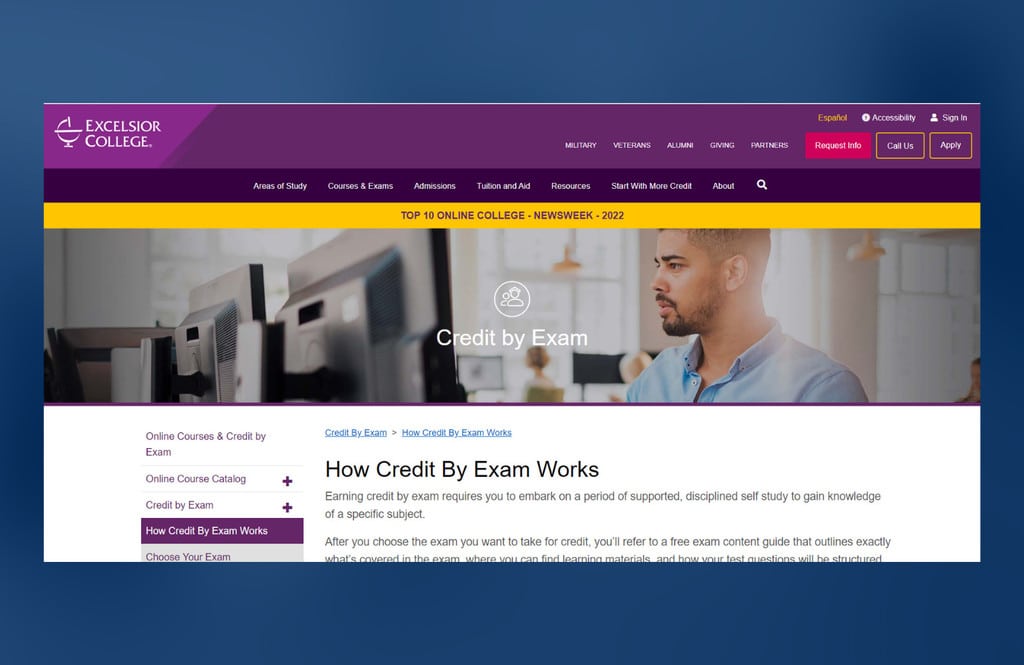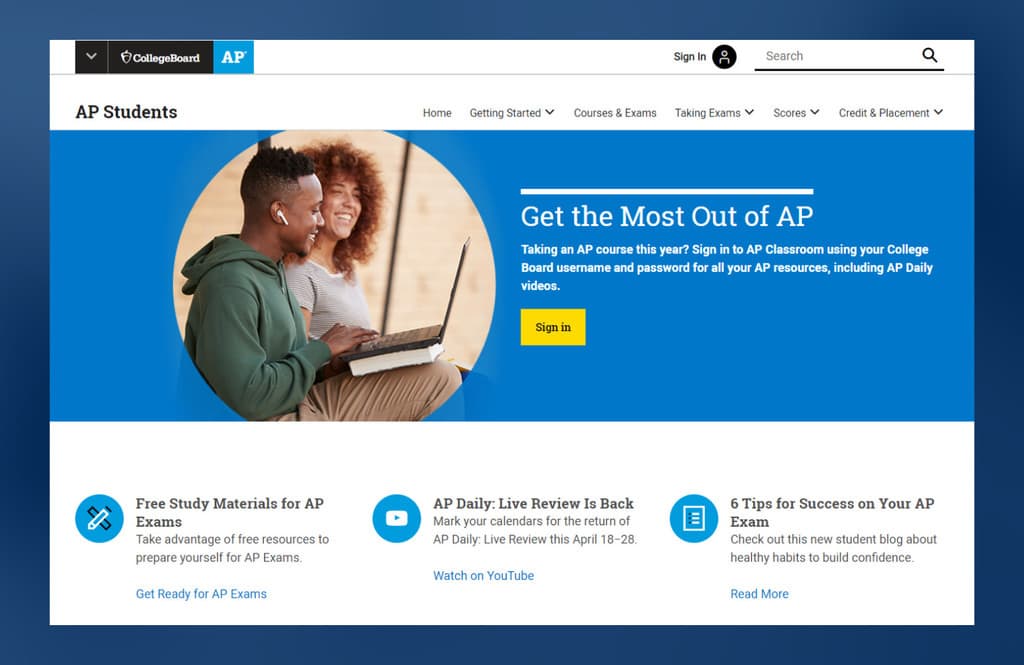Spending years going to college classes to earn your degree is pretty standard, but what if I told you that there are ways you can finish your degree in less time?

There’s no doubt that college is expensive, and scheduling classes around an already busy life can be overwhelming. By thinking outside the box and putting in a little extra effort, I will show you how earning your college degree faster is completely doable.
- Related Guide: Fastest Way to Get a Bachelor’s Degree
Editorial Listing ShortCode:
If you are struggling with the daunting reality of spending hours in a classroom for the next several years, save yourself some drama and spend a few minutes exploring better options.
The little known secrets I’m going to share with you in this article are a good place to start…
1. Take fast-track online classes

Back in the day, we had to sit in class for 16 weeks. Not anymore.
Now, you can take 8 week online classes from a number of accredited universities.
Without sacrificing quality… or accreditation!
More and more universities have started offering accelerated classes online. Semesters usually range from 6 weeks to 8 weeks long.
Editorial Listing ShortCode:
You can see a list of colleges offering fast-track classes in our accelerated online classes guide.
2. Credit for Prior Learning Portfolio

If you’ve had work experiences or other training that coincides with the instruction you’d get in the classroom, you may be able to earn college credit for it. We all know that education doesn’t always have to take place in a classroom, and I found that out first hand when pursuing my degree.
After working for 12 years at IBM, I was able to present this documented experience to my college and ended up receiving credit for three entry-level computer science classes and one information technology class!
So, how can you turn your work or military experience into college credit?
Many colleges around the country accept up to a certain number of credits for experience through what is called a credit for prior learning portfolio. In this portfolio, you will submit documentation that shows how your various experiences match up with the topics being taught in the courses for which you are desiring credit.
Here’s a list of universities that award college credit for prior learning.
Every school has different requirements and fees associated with submitting a prior learning portfolio, so be sure that you thoroughly understand their policies before diving in!
3. Competency Based Degrees

If you want complete control of your degree, Western Governor’s University is a unique option allowing you to set your own pace for a truly individualized program.
- Private, nonprofit university
- Allows you to earn your degree by passing a series of competency-based assessments
- The faster you progress through your program, the lower the cost
- 76% of students receive some form of financial aid or scholarships
For the complete scoop, check this out: Set Your Own Pace with WGU’s Competency-Based Degrees
WGU is regionally accredited, the gold-standard for accreditation.
4. College Level Examination Program (CLEP) Credit

“Testing out” of college classes may seem too good to be true, but thousands of schools across the country accept recognized examinations as a way for you to earn credit for college courses. The College Level Examination Program (CLEP) is one of the most widely accepted of these exams.
Here are some fast facts about the CLEP to help you get started:
- Over 2,900 colleges grant credit for successfully completed CLEP exams
- There are more than 1,800 testing centers around the country
- CLEP offers 33 different exams that cover a broad range of topics, including literature, mathematics, and science
- Each 90 minute test costs $85
Every college has different policies for the number of credits by examination that they will accept, so be sure that you check in with your advisor before proceeding with the CLEP. As a general rule of thumb, most colleges limit credit by exam to 15 credit hours – which is typically about five college classes.
My college accepted up to 15 credit hours and I took advantage of every single credit!
5. DSST Credit

Formerly known as the DANTES Subject Standardized Tests, the DSST is another examination program that allows you to pass tests on a variety of subjects to earn college credit. Like the CLEP, this exam program is widely accepted, and more than 1,900 colleges and universities accept DSST credit.
When taking a DSST exam, you will be given two hours to answer 100 questions, and testing centers are located across the country. The exams start at $80, however, there may be additional fees from the testing center. If you are a military member, the DSST offers free, first-attempt testing at military bases and institutions across the United States!
6. Excelsior College Exams (ECE)

The Excelsior College Exams are another testing option if you are looking to get some credits for prior learning in order to accelerate your degree program. This testing program has more options for exams, but it is not as widely accepted as the DSST or CLEP. Be sure to check with your school before registering for this exam to see if they accept ECE for credit!
With more than 50 different tests available, there are many options to put your prior knowledge to work in order to save time and money on your college tuition. Testing categories include Business, Humanities, Natural Science, and History. This exam will cost you a bit more than some of the other options at $110, but they do offer payment plans and combination packages to help make the process more affordable.
7. AP Credit

Getting your degree on the fast-track with Advanced Placement exams can be a great option if you’re willing to put in some extra effort. Typically, if you earn a score of three or higher on your AP exam, you can receive credit towards your college classes or advanced placement in your degree program.
Nearly all higher education institutions in the U.S. accept AP credit, but not every school allows both credit and advanced placement – you will likely get one or the other. You’ll want to check with your school’s admissions team to determine what their specific policies are, but either way, you will be saving time and money on your degree by advancing more quickly through your program.
8. Challenge Exams

If you are looking though the course descriptions for your upcoming classes and realize that you already know the material being taught, it is worth asking if your school offers Challenge Exams! These exams are offered by individual colleges, and they are similar in layout to final exams for the specific courses.
While these may seem similar to CLEP, DSST, or other nationwide exam programs, there are some distinct differences. Some schools will not allow Challenge Exams to be taken if an equivalent CLEP or DSST exam is already available. Additionally, there may be other regulations, such as only being able to take the exam one time, outlined by your school policies.
Most universities outline their challenge exam policies in their academic catalog (generally, in the same section where you will find info regarding CLEP and DSST acceptance and limitations).
9. Massive Open Online Course (MOOC)

Technology is constantly evolving, and the Massive Open Online Course (MOOC) program is a great example of how improved technology can ultimately benefit college students. Standard MOOCs offer free, open enrollment access to college level courses for anyone who is interested – the typical drawback to this was the lack of ability to use completed courses as transfer credits for college. Times are changing though, and many schools are starting to jump on board with MOOC-style offerings!
Select schools around the country are now starting MOOC programs through edX.org in which students can take courses at a significantly reduced rate and apply them to their degree program. While some MOOC courses may be offered for free, earning credit requires you to pay a fee to the college, which is usually cheaper than taking traditional courses. It’s important to do your research into the fee structure of your school when deciding if this is a good route for you.
10. Military Training Programs

Are you a veteran who wants to advance their education? Did you know that your military training could be used as college credit to advance your degree program? Well, it’s true! And there are several options available if you are a veteran or active service member that wants to turn your specialized training into credit towards a degree.
Three of the most common options to get credit for military training include:
- Joint Services Transcript: This official record of your training is approved for credit by the American Council on Education and can be submitted to your school of choice.
- Credit by Examination: There are several exam programs you can explore to “test out” of certain classes. The DSST is even fully funded for military members!
- Prior Learning Assessment: By using supporting documents, achievements, and certifications, you can present a portfolio to your school that demonstrates your knowledge in a subject area.
Every school has different policies for accepting credit for military training, and some schools only transfer credit to electives instead of degree-specific courses. To avoid any issues, just check with your school beforehand to get a thorough understanding of their policies.
11. Dual Credit
If you are a high school student who wants to get a head-start on college, the options may seem limited, but dual credit can be great way to get a leg-up on your future degree program. Dual credit programs allow high schoolers to take college credit classes before they graduate. This means that the credit you earn goes towards both your high school requirements and future college credit!
These dual credit courses are real college classes, and they will appear on a transcript when you apply to begin your undergraduate degree. They are also much cheaper than taking classes outside of high school, and you could save more than 95% on the cost of your tuition for the course without even leaving your school!
12. International Baccalaureate (IB)
Like the AP program, the International Baccalaureate is a way for high school students to complete college level courses before they graduate high school. If you are a driven high school student, this is an excellent option to look into to get a jumpstart on your education! There are several different IB programs available, and in the Diploma program, students in their junior or senior year of high school can take a series of courses and assessments that allow them to earn a diploma recognized at colleges around the world.
Whether you choose to take AP classes or commit to the IB program is a personal decision, and in many cases, it is advantageous to do a combination of both. Since IB is an international program, be sure to do your research beforehand to see if your school is one of the participating institutions.
13. ACE Credit Recommendations

Many of the options available for speeding up your college education involve getting credit for previous college courses and learning experiences, and the American Council on Education (ACE) is the gold standard for deciding what can be accepted as college credit. The review team for the ACE is made up of subject matter experts that evaluate what experiences can or cannot be substituted for classes that you would be required to take in your degree program.
The ACE offers academic credit recommendations that have the following benefits:
- 35,000 courses, exams, and certifications across more than 600 organizations
- Acceptance at over 2,000 college and universities
- Military options for veterans and active service members
The process of obtaining ACE credit is fairly straightforward. If you’ve successfully completed a course, exam, or certification that comes with an ACE credit recommendation, you can get an official transcript to submit to your school for credit. If you want to see if your courses or organization has been reviewed for ACE Credit, just use the search links on the ACE website.
Make it happen!

If you want to earn a degree without spending years dragging yourself to college classes, there are several options to get on the fast-track to graduation. With a bit of research and determination, you can turn your prior knowledge and experience into verifiable college credit that gives you the opportunity to earn your degree in less time than you may think!
Have you found creative ways to earn college credit in less time? How did you do it?

